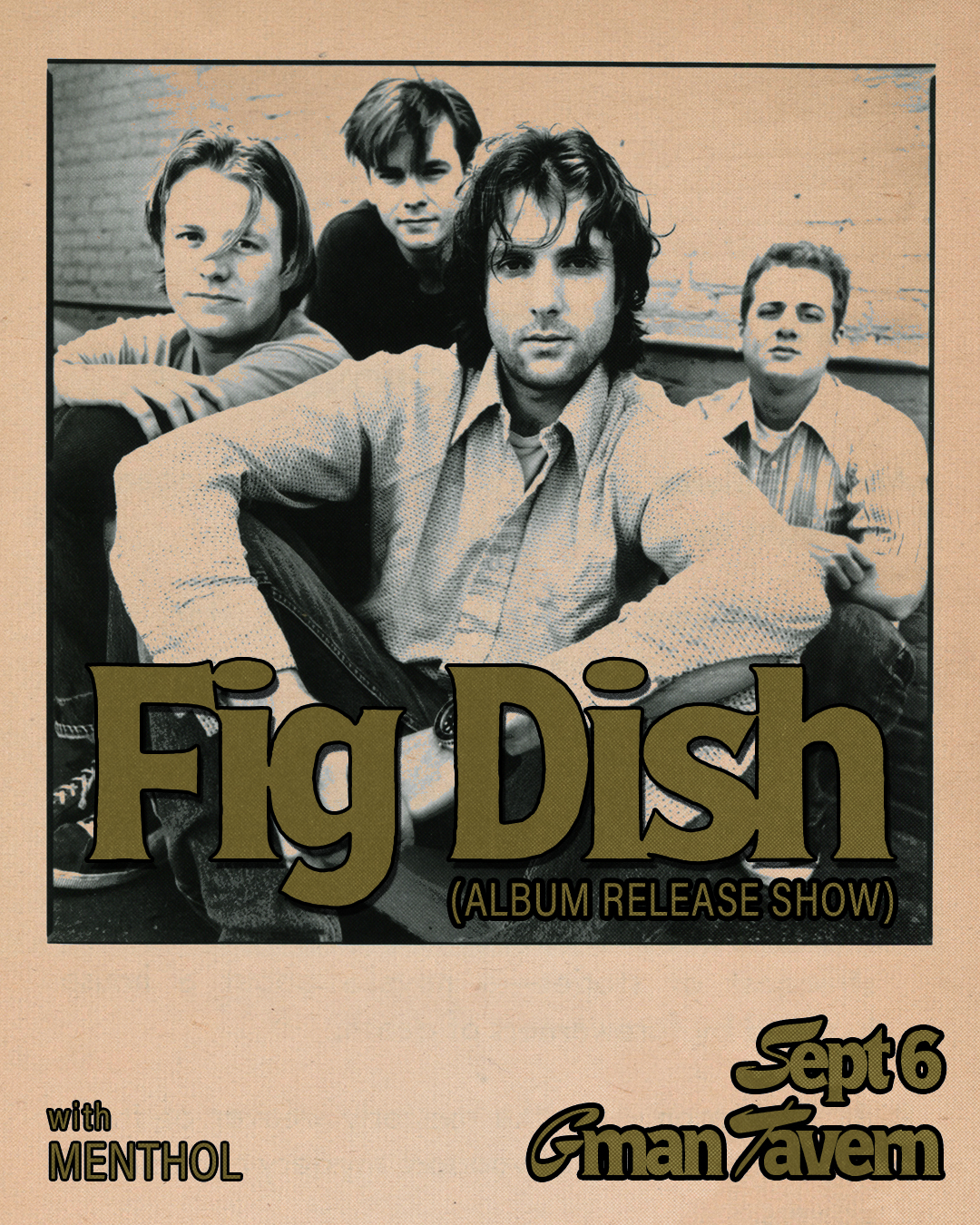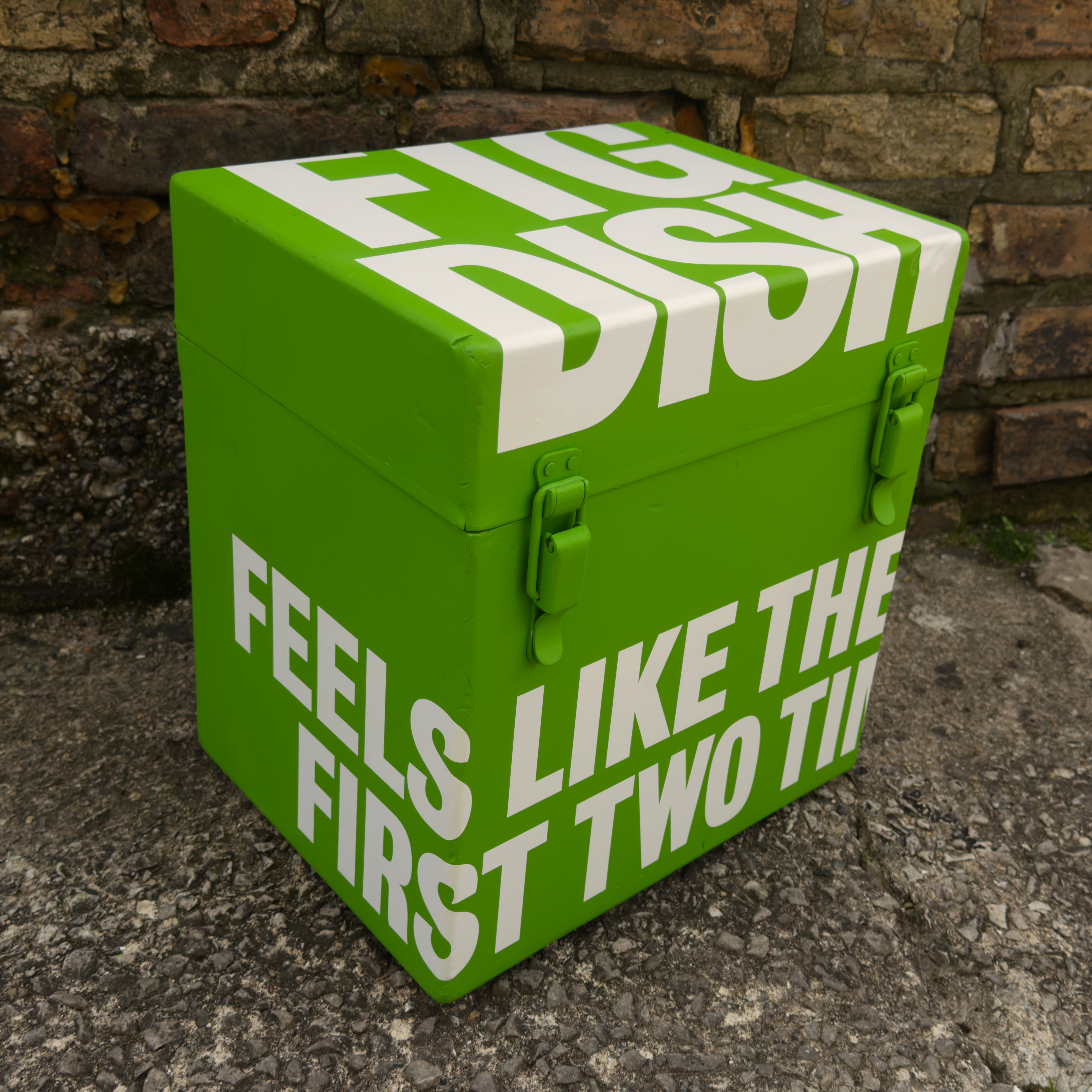Now Playing
Current DJ: Joanna Bz
Weaklung Banned Books from We Bring About Our Own Demise (self-released) Add to Collection
Requests? 773-DJ-SONGS or .(JavaScript must be enabled to view this email address)
by Andy Frye
 It’s been 27 years since Fig Dish released their last full-length album, but this Chicago-based band has not lost a beat. If you don’t believe me, ask **Steve.
It’s been 27 years since Fig Dish released their last full-length album, but this Chicago-based band has not lost a beat. If you don’t believe me, ask **Steve.
The band of high school friends—guitarists and vocalists Rick Ness and Blake Smith, bassist Mike Willison, and drummer Andy Hamilton—put out their newest single "Burn Bright For Now” in June, with another to follow.
You can hear "Burn Bright” now on Spotify and other streaming services. Listeners who know Fig Dish will detect the same sound and fury the band was always known for. I spoke with Ness and Smith a week ago via Zoom, and they explained it all.
“People don’t realize that these are songs we recorded in 1998,” Smith said, “but we didn’t put out because the band broke up.”
“We were trying to put together our third album at that time,” Ness said of the 1998 recordings, “but we got dropped, and another label deal didn’t materialize, so we split up into our different projects.”
Fig Dish subsequently splintered into the electronic-tinged band Caviar, made up of Smith and Willison, while Ness formed a prog rock-influenced outfit, Ness, with Bill Swartz and Veruca Salt’s Jim Shapiro. After other projects in the late ‘90s and early 2000s, Smith took up work in the entertainment industry, and Ness got his Ph. D in English to become a college professor at the University of Wisconsin-Madison.
“Ragged Ones” — A first listen on CHIRP
Even if, for the moment, what’s old is new again, there’s more on the horizon for Fig Dish and the band’s nostalgic fans. First, Fig Dish is set to play two sold-out shows at the GMan Tavern, Sep. 5 and 6, with fellow Chicago scene members Menthol.
But if you don’t have tickets to the show, you can pre-order the next Fig Dish album Feels Like The Very First Two Times on vinyl on Forge Again Records here.
There’s also Fig Dish track titled “Ragged Ones” premiers publicly on Friday, August 23rd. Even better, you can listen to it here.
Luckily for anyone who loved Fig Dish’s first two albums That’s What Love Songs Often Do (1995) and When Shove Goes Back To Push (1997), the newest tracks, dare I say, take you straight back to the ‘90s.
Smith describes both “Burn Bright” and “Ragged Ones” as “a continuation of what we were doing at the time. I know that’s not an exciting answer,” he joked.
And for all the heavy guitars and hard rock rhythms that define Fig Dish’s excellent work, Smith thinks there wasn’t a focus on any “rock n’ roll lifestyle” when the band got on stage or sat down to write songs.
“The good thing about the music scene in the '90s was that it wasn’t about groupies, being abusive, or anything creepy. There was a lot of partying going on between all the bands,” Smith admits, “But it was really just talking about records and staying up late.”
Ness adds a different angle and points to a rising emphasis on authenticity, which he said was just part of the fading afterglow of 1980s glamor and hair metal.
“There was a bit of an anti-rock star ethos in the early to mid-‘90s,” Ness said. “By the end of the ‘90s, however, that had faded.” Ness hints that the ‘90s music scene ended with the return of boy bands and record company megastars like Britney Spears and, later, Justin Bieber.
However, Ness and Smith both agree that Chicago’s music scene then had its own towering performers.
“It’s funny that we would hang out with Nash Kato from Urge Overkill, and both he and Jim Ellison from Material Issue were larger than life. We were friendly with all of them,” Smith said, recalling that the Chicago scene had a certain feel.
“You could see a generational shift with bands like us, Veruca Salt, Triple Fast Action, and Menthol. It wasn’t about putting on a velour suit and waiting for fans to come up and fawn all over you.”
 Ness said Material Issue and Urge Overkill, both of whom had huge albums in the first half of the 1990s, were a “first wave” of Chicago’s music scene before bands like theirs went über-indie. “Most of the ‘90s scene draws from independent labels and indie bands,” said Ness. He and Smith both mentioned Twin Cities legends Hüsker Dü as a driving force.
Ness said Material Issue and Urge Overkill, both of whom had huge albums in the first half of the 1990s, were a “first wave” of Chicago’s music scene before bands like theirs went über-indie. “Most of the ‘90s scene draws from independent labels and indie bands,” said Ness. He and Smith both mentioned Twin Cities legends Hüsker Dü as a driving force.
“On my street, growing up, I remember that you were either a team Kiss or team Cheap Trick,” Smith added, saying that he was more a member of team Cheap Trick. “Then, I remember picking up my copy of (Hüsker Dü’s) New Day Rising, and my mind was blown.”
After moving from California to Chicago in the mid-1980s, Smith met Ness in a middle school music appreciation class and eventually decided to learn guitar to try out for Ness’s band.
Smith remembers it, saying, “I wasn’t a good musician, and I faked it to be in Rick’s band.” Ness responded that Smith was just good enough and made the cut.”
Thanks for the hookup, Steve
The story behind how Fig Dish got signed to a record deal is perhaps consistent with the band's wry lyrics. The band’s publicist, Katie Hovland, explains that before artists were found via YouTube or social media, the good ol’ name-check played its role.
That’s where **Steve comes in.
In the fall of 1994, the band sent envelopes with their first demo to several A&R reps with a note reading:
“Hey [insert A&R person’s name]. I just saw these guys at CBGBs. Really great band—totally your type of thing. ~Steve.”
Fig Dish gambled on the idea that most people—even record company employees—know someone named Steve.
Polygram contacted the band a couple of weeks later, and almost immediately, a rep flew to Chicago to see a live show. Three weeks later, Fig Dish was in Woodstock, New York, at Dreamland with famed producer/engineer Lou Giordano (known for his work with Bob Mould, Mission of Burma, Big Dipper, and Sunny Day Real Estate).
The end result was their 1995 debut album That’s What Love Songs Often Do.
Around that time, Smith and Ness had become particularly close with Veruca Salt, with the bands playing shows together, while Smith and Veruca Salt’s Nina Gordon began to date. Smith tips his hat to Veruca’s energy, “great songs,” and stage presence but names one other 1990s band as a significant influence on both.
“We played shows with The Muffs, an absolutely phenomenal live band. They made us and Veruca Salt so much better because if (we) didn’t bring it on stage, we were going to get our asses kicked every night.”
Next entry: CHIRP Radio Weekly Voyages (Aug 26 - Sep 1)
Previous entry: The True Story of Brad Wood, Producer